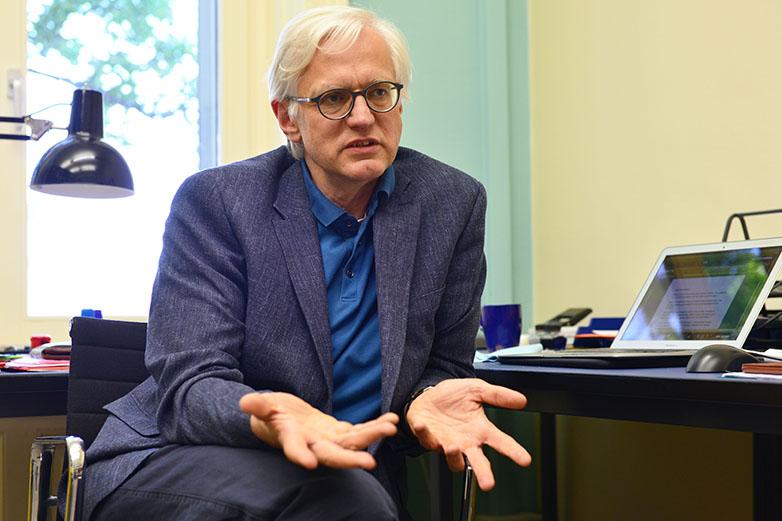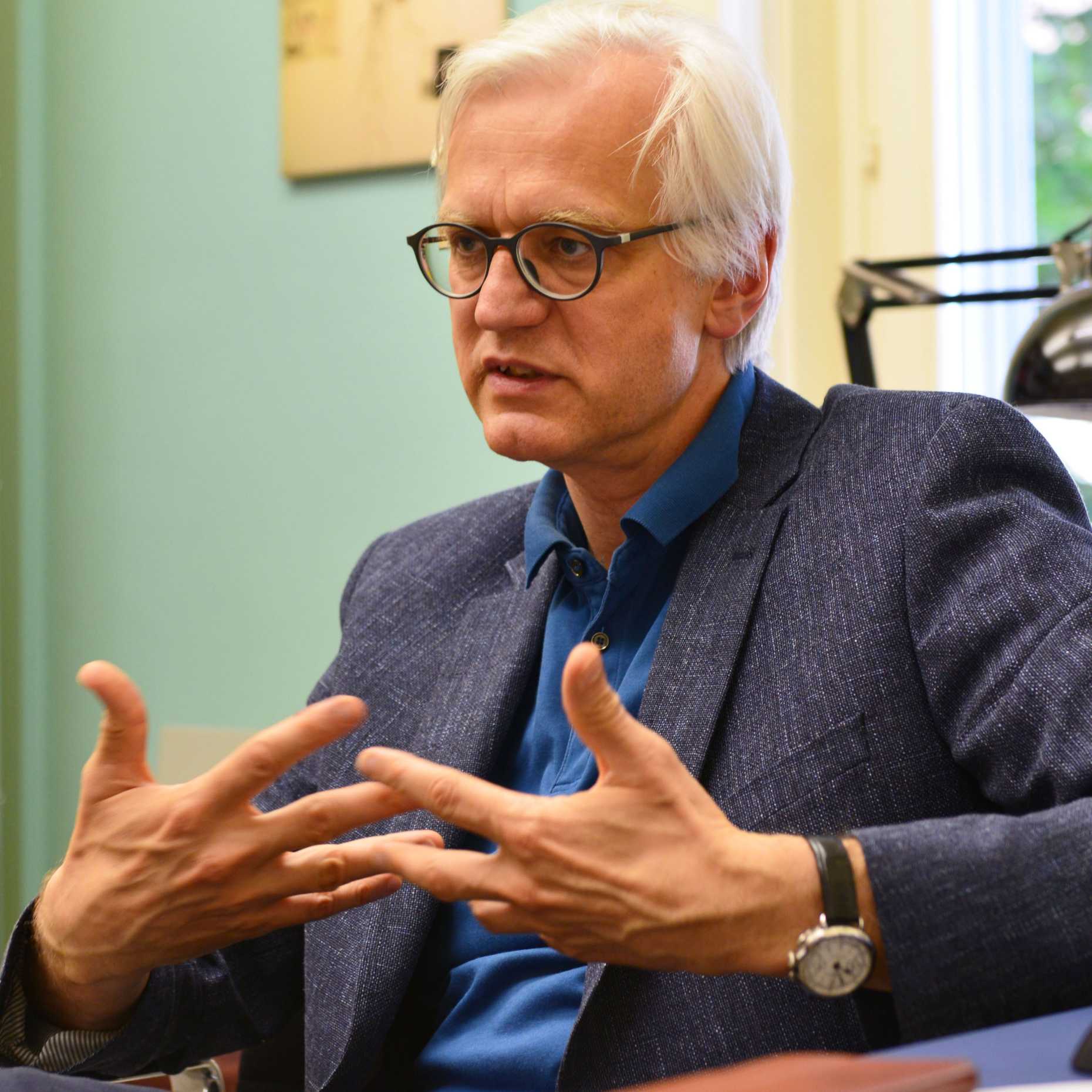"Don't rely on your holidays to make you happy"
Travel and happiness have a complicated relationship – even the Stoics were aware of this. An interview with philosopher Michael Hampe on the opportunities and risks that come with travelling.

Mr Hampe, travel has never been more popular – millions of Europeans will travel abroad again this summer to lie on the beach, climb breathtaking mountains, or explore cathedrals and museums in foreign cities. How has the art of travel and what people hope to get out of it changed over time?
People travel for many different reasons. Educational travel, as was popular in the early modern period, is still prevalent today – an entire industry has been built on natural historical and cultural travel. The industrialisation of holidays has increasingly turned travel to remote, exotic locations into a mark of social prestige. People talk about where they've been on holiday, and this leads to competition – for example, who's been to Fiji and how many times.
Educational travellers also tended to come from affluent families. Has travel always been associated with prestige?
Yes, but holidays and travel only became popular with the emergence of the working society. Our perception of work as the normal condition with a shortage of leisure time is characteristic of our society. In Latin, for example, work is described as negotium, which translates as "non-leisure". In a slave society, leisure was the normal condition. Political, artistic or scientific activities were not considered work. Today, the relationship between leisure and work is the opposite. Nowadays, not even wealthy people would say they don't work – otherwise they would be deemed unemployed.
Why have holidays become popular in this working society?
Work is no longer fun for many people. It is psychologically and physically exhausting, and they need to recover from it. Just like athletes, workers now also require time to regenerate. This is a relatively new phenomenon.
Many philosophers, such as Hans Magnus Enzensberger, Friedrich Nietzsche and Jean Baudrillard, described travel as something profane and a form of escapism. Where does this contempt come from for an activity that many people value above all others?
Philosophers often perceived travel as a type of escapism. They criticised the belief that it was possible to solve life's problems with a change of location. This played a particularly important role for the Stoics: Seneca dispelled this illusion. Generally, problems in life have less to do with a place, and far more to do with a person's character and habits – and you can't escape from those on holiday.
So did the Stoics see it as a virtue to sit in Athens without discovering the world around them?
Escapism is viewed negatively by many philosophers. We can see this very clearly with Socrates, for example: when he loses a trial and is condemned to death, his friends bribe the prison guards. Instead of fleeing Athens, he stayed put, since he saw exile as a terrible alternative that was no better than death.
Not everyone would agree with Socrates' negative perception of travel.
You have to remember that philosophers are homebodies who spend most of their time reading and writing. For them, this is the norm. For other people who like to travel and move around, this would be tantamount to torture. Nomadic peoples would also find it rather absurd to be constantly tied to one place. Philosophy is an activity of settled, landed people in cities. We need to remember this when we consider philosophers' views on travel.
When we arranged this interview, you were in Moscow on a lecture tour. That's not something you'd find on a homebody's agenda.
Of course, as an academic at a modern university, I often travel to conferences or give lectures at other universities. But I don't force it. I try to be as settled as possible, so I can focus on my work. That has a unique quality.
Is this also true of your holidays?
Yes, for the past 30 years I've always travelled to the same place on the North Sea, so I don't have to spend time settling in, but still get a change of scenery. I travel enough on academic trips, so I don't need to travel any more during my holidays – I'm much more interested in finding peace and quiet.
Peace and quiet, so you can keep working?
Yes, so I can have a long period to focus on my academic work again. In your everyday work as an academic, your writing is often interrupted by administrative tasks, meetings or lectures. This creates stress, as you're constantly trying to understand other texts rather than focussing on the one you're actually trying to write. For me, the opportunity to spend four weeks writing without interruption is very relaxing – even if I spend quite a lot of this time reflecting. This is a privilege when you have a meaningful, non-alienated job. The same is probably true for artists. After a period of rest, you can crave uninterrupted creativity just as much as you craved a break from the everyday routine.
Until now, we've spoken mainly about negative perceptions of travel. But what about the romantic idea that travel can help people to broaden their horizons?
The question is, what type of travel encourages this type of development? If you travel to a tourist resort, there's little chance that you'll get an insight into another culture. But if you work abroad for a year, you will gain another perspective on your native country. You'll begin to question truths that you take to be self-evident back home. At least, that was how I felt when I returned to Germany after spending time in England. The open hierarchy in English academic circles made me scrutinise the hidden hierarchy at German universities.
Are there particular conditions required for travel to be an enlightening experience that promotes a multicultural outlook?
In order to be influenced by foreign cultures, you have to suspect that your own view of the world is incomplete and one-sided. Of course, some narrow-mindedness stems from an ignorance of foreign cultures; but anyone who believes that theirs is the only valid view of the world will also encounter more invalid and erroneous world views and behaviours in foreign cultures. However, someone who is inclined to be changed by foreign cultures is probably not particularly narrow-minded by nature.
Finally, can you give our readers some advice on how to enjoy their holidays?
It's good to have low expectations, so that you don't rely on your holidays to make you happy. If you expect to be constantly happy for two weeks straight, happiness may be hard to find. And beware of trying to keep up with the Joneses – people are often disappointed because they think they have to go on a certain holiday for image reasons, even though they don't really want to. Different people also attach importance to different experiences, which can often cause problems on holidays. Take my son, for example: when his mother and I want to take him to the museum, he suffers; and when he whinges, we suffer. A certain willingness to compromise is necessary for a successful holiday.
About
Michael Hampe has been full Professor for Philosophy at ETH Zurich since the winter semester 2003/04. He grew up in Hanover, and studied philosophy, psychology and German literature in Heidelberg and Cambridge. His work focusses on the philosophy and history of the empirical sciences, critical theory and metaphysics, the relationship between science and the public interest, and techniques for self-reflection.

Comments
No comments yet